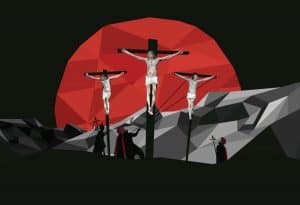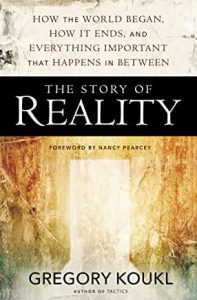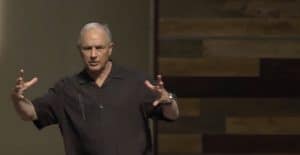God proved His love on the Cross. When Christ hung, and bled, and died, it was God saying to the world, “I love you.”
—Billy Graham—

Against the backdrop of the coronavirus pandemic, this is Holy Week. Sunday is Easter, a day when Christians worldwide joyfully will celebrate the resurrection of Jesus Christ from the dead. As Paul wrote to the Christians in Corinth in 1 Corinthians 15:1-8,
15:1 Now, brothers and sisters, I want to remind you of the gospel I preached to you, which you received and on which you have taken your stand. 2 By this gospel you are saved, if you hold firmly to the word I preached to you. Otherwise, you have believed in vain.
3 For what I received I passed on to you as of first importance: that Christ died for our sins according to the Scriptures, 4 that he was buried, that he was raised on the third day according to the Scriptures, 5 and that he appeared to Cephas, and then to the Twelve. 6 After that, he appeared to more than five hundred of the brothers and sisters at the same time, most of whom are still living, though some have fallen asleep. 7 Then he appeared to James, then to all the apostles, 8 and last of all he appeared to me also, as to one abnormally born.
Paul noted that Jesus authenticated His resurrection though a large number of personal appearances, one of which was to “more than five hundred of the brothers and sisters at the same time.” He went on to say that while some in this large crowd already had died, most still were living. His implication is quite clear. If anyone doubts Jesus’ resurrection, plenty of people who saw him after He died, was buried, and was raised are still around! Let the doubters ask these eyewitnesses! They will affirm the truth of what I am saying.
Jesus Heals
We’ll return to the topics of Jesus’ death and resurrection in a moment, but let’s first consider numerous miracles Jesus performed during His earthly ministry. Many of these—a great many—were healings. This is especially significant for us as we currently are experiencing a worldwide pandemic. We feel great compassion and concern for those who are sick, as well as for their families. We have been praying for the spread of COVID-19 to slow down quickly and to stop soon, and we have been praying for God to keep healthy people healthy and to heal the sick.

Especially during a pandemic, we as Christians long to see divine healing. We must not assume the healings taking place around us are not orchestrated by God. We should be aware of this truth about Jesus’ ministry, though: The New Testament is clear that His miracles, including the healings He performed, were not ends in themselves, but means to the end that people might recognize who He was.
It is no accident that Jesus frequently is called the Great Physician. He validated His claims about who He was — and He did indeed claim to be God — through a host of miracles, many of which (as we have said) were healings from physical sicknesses. Go here for a discussion of the miracles Jesus performed when He made sick people well. The implications of these supernatural actions are beyond significant.
The One Thing Jesus Could Not Do
In the physical realm, Jesus could and did heal instantly and completely. This should not surprise us, for He was God. Yet there was something He could not do. He could not pave the way for people to be forgiven by the Father without going to the cross and dying a substitutionary death.
Jesus could not pave the way for people to be forgiven by the Father without going to the cross and dying a substitutionary death.

Of course, when Jesus told people that their sins had been forgiven or that their faith had made them well, He meant what He said, and He was 100 percent correct. Still, the basis on which God the Father would forgive those people, as well as everyone else who would put his or her faith in Jesus for salvation, was an event that was yet to occur. In a short while, Jesus would be nailed to a Roman cross, be lifted up, and would die to pay for humanity’s sins. Had that not happened, God could never have forgiven anyone for his or her transgressions against Him.

God is loving. He created humanity—men and women, boys and girls—to enjoy fellowship with Him. And yet, from the beginning, people decided to go their own way and disobey God. It wasn’t just the first couple who did that, either! It also has been everyone since, without exception. Yes, God is loving, but He also is perfect—utterly holy. He cannot abide sin, not even the sin we would consider to be the slightest and least significant. Nor can He abide sinful human beings. In fact, God is angry over sin; His holy character mandates this. Accordingly, the penalty for sin is death in its most ominous sense—total separation from God forever! Even so, God loved us and wanted us to know Him.
Remarkably, God loved us despite our having rebelled against Him. Paul wrote in Romans 5:6-8,
 You see, at just the right time, when we were still powerless, Christ died for the ungodly. Very rarely will anyone die for a righteous person, though for a good person someone might possibly dare to die. But God demonstrates his own love for us in this: While we were still sinners, Christ died for us.
You see, at just the right time, when we were still powerless, Christ died for the ungodly. Very rarely will anyone die for a righteous person, though for a good person someone might possibly dare to die. But God demonstrates his own love for us in this: While we were still sinners, Christ died for us.
How can we possibly comprehend this? Yet it happened!
We would be in a totally hopeless situation were it not for God’s great love, which compelled Him to send His own Son, Jesus Christ, to live a perfect life and to be executed on a Roman cross in our place (see 1 Pet. 3:18). On a Passover Friday, Jesus shed His blood on our behalf and died an unspeakably horrible death, but He rose from the dead the following Sunday morning, demonstrating God’s approval of His holy life and His death as payment for our sins.

Did Jesus Have to Die?
But did Jesus have to die? someone may ask. Yes, He had to die. As God, Jesus could do many things, such as creating the universe and everything in it, turning water into wine, feeding the multitudes with what essentially were small sack lunches, and healing people of sicknesses completely and instantaneously.
And yet, He could not make it possible for God the Father to forgive people of their sins without dying in their place. As the inspired writer of Hebrews affirms, “without the shedding of blood there is no forgiveness” (Heb. 9:22).
Why Did Jesus Have to Die?
Well then, why did Jesus have to die? Because God, who is holy and perfect to an extent beyond our ability to comprehend, cannot simply overlook sin. His character will not allow Him to. Robert Laidlaw explains, saying that after an event at which he’d spoken,
a young man asked me, “Do you think it fair of God to set the standard of holiness so high that we cannot reach it, and then judge us for falling short?” I replied, “God has not set an arbitrary standard of holiness. He has not really set a standard at all; He is the standard. He is holiness in the absolute—holiness personified—and to preserve His own character, He must maintain that absolute standard in all His dealings with man, irrespective of the tremendous problems it creates for both Him and us.”
God has not set an arbitrary standard of holiness. He has not really set a standard at all; He is the standard. He is holiness in the absolute—holiness personified—and to preserve His own character, He must maintain that absolute standard in all His dealings with man, irrespective of the tremendous problems it creates for both Him and us.
—Robert Laidlaw—
 There’s no better time than Easter to reflect on the words “irrespective of the tremendous problems it creates for both Him and us.” What were the most pressing problems? I’ve read no clearer answer to that question than the one given by speaker and author Gregory Koukl in his book The Story of Reality:
There’s no better time than Easter to reflect on the words “irrespective of the tremendous problems it creates for both Him and us.” What were the most pressing problems? I’ve read no clearer answer to that question than the one given by speaker and author Gregory Koukl in his book The Story of Reality:
So, Jesus came to earth to save sinners. The statement is so common to our ears, it is easy to miss its significance. Save means to “rescue from imminent danger.” Jesus came to rescue us because we were in danger. What was that danger? What was Jesus rescuing us from? Here is the answer. Jesus did not come to rescue us from our ignorance or our poverty or our oppressors or even from ourselves. Jesus came to rescue us from the Father.1,2
Wow! In these statements we see some important insights about the social justice narrative, do we not? It isn’t that Jesus wasn’t concerned about poverty or oppression in society, but that He didn’t come primarily to address these and other social justice issues.
Why did Jesus come? Koukl has affirmed already that He “came to rescue us from the Father.” He continues,
Remember, the King is angry. He is the one who is offended. he is the one who is owed. He is the Sovereign we have rebelled against, the Father we have disobeyed, the friend we have betrayed. And that is a dangerous place for us to be. Jesus said, “Do not fear those who kill the body, but are unable to kill the soul, but rather fear him who is able to destroy both soul and body in hell.”3
Hear Greg Koukl himself explain these ideas in the clip below, which was taken from this presentation of “The Story of Reality.”

No wonder Scripture tells us that fearing God is the beginning of wisdom! Only when we properly fear Him can we even begin to understand and experience His love!
Jesus’ Greatest Work
Having paid the price for our sins through His death, having been buried, and having been raised from the dead on Sunday morning following the Passover Friday when He died, Jesus stands ready to plead our case before God the Father—right now, but especially when the time of judgment comes. We cannot claim to be innocent, for we are guilty! Jesus will not say we are innocent, but that He paid the penalty for our sins, and on that basis, we must be declared innocent! On the “paperwork” condemning us to death for our sins, Jesus stamps this notice:

This is the gospel, and it is good news! But we have to invite Jesus to serve as our defense attorney in the Courtroom of Heaven.
Have you done that? If not, you can do it today!
Physical healing is wonderful, but it is temporary at best. Spiritual healing and the forgiveness that comes with it is a gift that is so great it’s impossible to describe —
and it lasts forever!
Copyright © 2020 by B. Nathaniel Sullivan. All rights reserved.
Unless otherwise indicated, Scripture references in this article have been taken from The Holy Bible, New International Version®, NIV® Copyright © 1973, 1978, 1984, 2011 by Biblica, Inc.® Used by permission. All rights reserved worldwide.
1Gregory Koukl, The Story of Reality: How the World Began, How It Ends, and Everything Important that Happens in Between, (Grand Rapids: Zondervan, 2017), 117. Learn more about Koukl’s book here.
2In a footnote, Koukl offers this clarification: “Jesus saves us from the Father, but His intention is not at odds with the Father since it was the Father who, out of love, sent Jesus to rescue the world in the first place.” Koukl, 190.
3Koukl, 117.
top image credit: Healing of the Blind Man by Jesus Christ by Carl Bloch

Be First to Comment